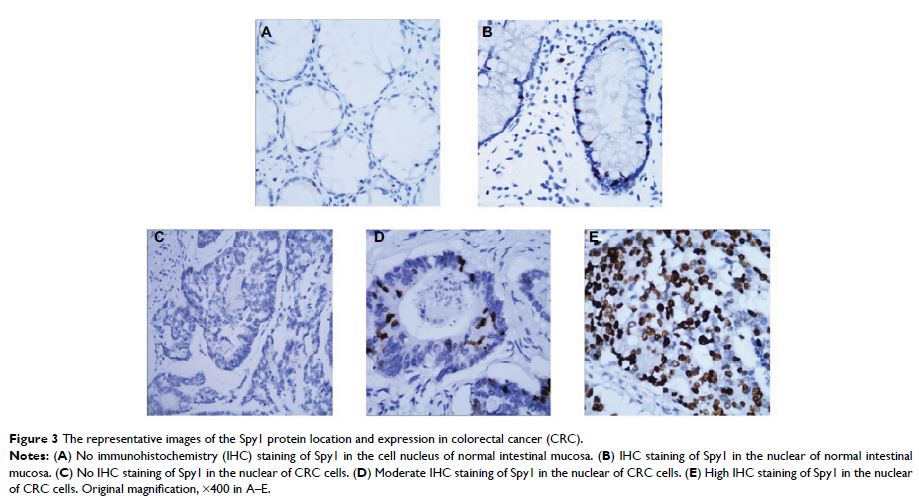108384
论文已发表
注册即可获取德孚的最新动态
IF 收录期刊
- 3.4 Breast Cancer (Dove Med Press)
- 3.2 Clin Epidemiol
- 2.6 Cancer Manag Res
- 2.9 Infect Drug Resist
- 3.7 Clin Interv Aging
- 5.1 Drug Des Dev Ther
- 3.1 Int J Chronic Obstr
- 6.6 Int J Nanomed
- 2.6 Int J Women's Health
- 2.9 Neuropsych Dis Treat
- 2.8 OncoTargets Ther
- 2.0 Patient Prefer Adher
- 2.2 Ther Clin Risk Manag
- 2.5 J Pain Res
- 3.0 Diabet Metab Synd Ob
- 3.2 Psychol Res Behav Ma
- 3.4 Nat Sci Sleep
- 1.8 Pharmgenomics Pers Med
- 2.0 Risk Manag Healthc Policy
- 4.1 J Inflamm Res
- 2.0 Int J Gen Med
- 3.4 J Hepatocell Carcinoma
- 3.0 J Asthma Allergy
- 2.2 Clin Cosmet Investig Dermatol
- 2.4 J Multidiscip Healthc

高 Spy1 表达预示结肠直肠癌预后不良
Authors Jin Q, Liu G, Bao L, Ma Y, Qi H, Yun Z, Dai Y, Zhang S
Received 26 March 2018
Accepted for publication 28 May 2018
Published 16 August 2018 Volume 2018:10 Pages 2757—2765
DOI https://doi.org/10.2147/CMAR.S169329
Checked for plagiarism Yes
Review by Single-blind
Peer reviewers approved by Dr Colin Mak
Peer reviewer comments 3
Editor who approved publication: Professor Nakshatri
Background: Spy1 (SPDYA) is a new discovered cell cycle protein capable of promoting cell proliferation dependent on cyclin-dependent kinase-2 activation. However, to the best of our knowledge, the expression of Spy1 in colorectal cancer (CRC) tissues remains virtually unknown.
Materials and methods: In this retrospective study, we investigated the mRNA and protein expression levels of Spy1 in CRC tissues and corresponding non-cancerous tissues with the analyses of quantitative real-time polymerase chain reaction, western blotting, and immunohistochemistry. In our research, the prognostic significances of Spy1 expression were further explored by univariate and multivariate survival analyses of 203 patients who were followed up.
Results: The results demonstrated that the levels of Spy1 mRNA were significantly higher in CRC tissues compared with corresponding non-cancerous tissues (p =0.0002). The results of immunohistochemistry demonstrated that the expressions of Spy1 were significantly associated with clinicopathological parameters, including T stage (χ 2=7.126, p =0.028) and TNM stage (χ 2=9.461, p =0.009). Kaplan-Meier analysis results indicated that high Spy1 expression (HR=2.573, p <0.001) and TNM stage (HR=1.494, p =0.011) were independent factors to predict poor prognosis for patients with CRC.
Conclusion: We concluded that high Spy1 expression is significantly associated with unfavorable prognosis in CRC and could serve as a potential prognostic marker in clinical diagnosis of CRC.
Keywords: Spy1, colorectal cancer, prognostic marker, clinical diagnosis
